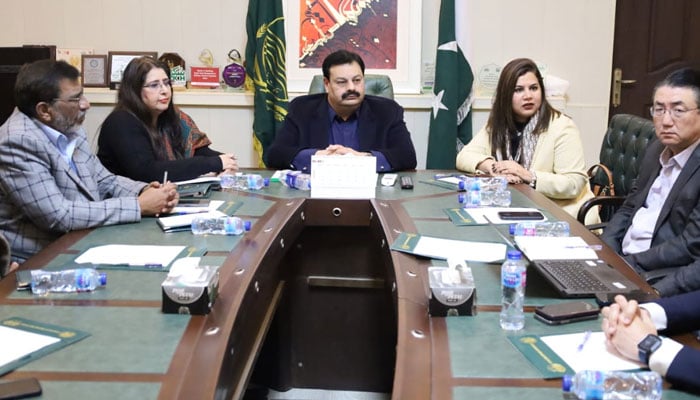Family planning programme being extended to remote areas
LAHORE:Punjab Population Welfare Secretary Salman Ijaz chaired a crucial meeting related to the World Bank's Punjab Family Planning Programme, here on Friday.
Director General (DG) Population and Punjab Population Innovation Fund (PPIF) Chief Executive Officer (CEO) Saman Rai, Additional Secretary (A&F) Ahmed Usman, Additional Secretary (Tech) Dr Naila Altaf, Director (A&F) Muhammad Shahid Nusrat, Director (Technology) Dr Zubdah Riaz and PPIF Chief Finance Officer Abdul Qayyum and other representatives attended the meeting.
Addressing the meeting, the secretary said that Punjab province is home to more than half of the country's population. This World Bank programme is based on improving the means and use of family planning to control population growth. This World Bank programme is providing free access to quality family planning services to the people of Punjab and institutionalising quality of care in family planning services.
He said that the delivery system focuses on creating awareness among the people and providing better health-related facilities to make more families aware of the benefits of family planning.
Secretary Population Welfare added that the World Bank programme would help in scaling up innovations like clinical franchising, voucher schemes, and family planning counseling through community leaders. He said that this programme had been piloted in different districts of Punjab and the results of family planning were improving. The programme is being extended to remote areas and communities where there is limited or no access to family planning services. He said that lady health workers, family welfare workers, and community health workers are linked to health facilities, family health clinics, and family welfare through a wide network.
Through this World Bank programme, the programme would support voucher incentive schemes, social marketing, engagement of men and community leaders, and youth platforms to increase utilisation of family planning services. Interconnection of service providers related to this would also be improved.
-
 Melissa Jon Hart Explains Rare Reason Behind Not Revisting Old Roles
Melissa Jon Hart Explains Rare Reason Behind Not Revisting Old Roles -
 Meghan Markle Eyeing On ‘Queen’ As Ultimate Goal
Meghan Markle Eyeing On ‘Queen’ As Ultimate Goal -
 Japan Elects Takaichi As First Woman Prime Minister After Sweeping Vote
Japan Elects Takaichi As First Woman Prime Minister After Sweeping Vote -
 Kate Middleton Insists She Would Never Undermine Queen Camilla
Kate Middleton Insists She Would Never Undermine Queen Camilla -
 King Charles 'terrified' Andrew's Scandal Will End His Reign
King Charles 'terrified' Andrew's Scandal Will End His Reign -
 Winter Olympics 2026: Lindsey Vonn’s Olympic Comeback Ends In Devastating Downhill Crash
Winter Olympics 2026: Lindsey Vonn’s Olympic Comeback Ends In Devastating Downhill Crash -
 Adrien Brody Opens Up About His Football Fandom Amid '2026 Super Bowl'
Adrien Brody Opens Up About His Football Fandom Amid '2026 Super Bowl' -
 Barbra Streisand's Obsession With Cloning Revealed
Barbra Streisand's Obsession With Cloning Revealed -
 What Did Olivia Colman Tell Her Husband About Her Gender?
What Did Olivia Colman Tell Her Husband About Her Gender? -
 'We Were Deceived': Noam Chomsky's Wife Regrets Epstein Association
'We Were Deceived': Noam Chomsky's Wife Regrets Epstein Association -
 Patriots' WAGs Slam Cardi B Amid Plans For Super Bowl Party: She Is 'attention-seeker'
Patriots' WAGs Slam Cardi B Amid Plans For Super Bowl Party: She Is 'attention-seeker' -
 Martha Stewart On Surviving Rigorous Times Amid Upcoming Memoir Release
Martha Stewart On Surviving Rigorous Times Amid Upcoming Memoir Release -
 Prince Harry Seen As Crucial To Monarchy’s Future Amid Andrew, Fergie Scandal
Prince Harry Seen As Crucial To Monarchy’s Future Amid Andrew, Fergie Scandal -
 Chris Robinson Spills The Beans On His, Kate Hudson's Son's Career Ambitions
Chris Robinson Spills The Beans On His, Kate Hudson's Son's Career Ambitions -
 18-month Old On Life-saving Medication Returned To ICE Detention
18-month Old On Life-saving Medication Returned To ICE Detention -
 Major Hollywood Stars Descend On 2026 Super Bowl's Exclusive Party
Major Hollywood Stars Descend On 2026 Super Bowl's Exclusive Party




